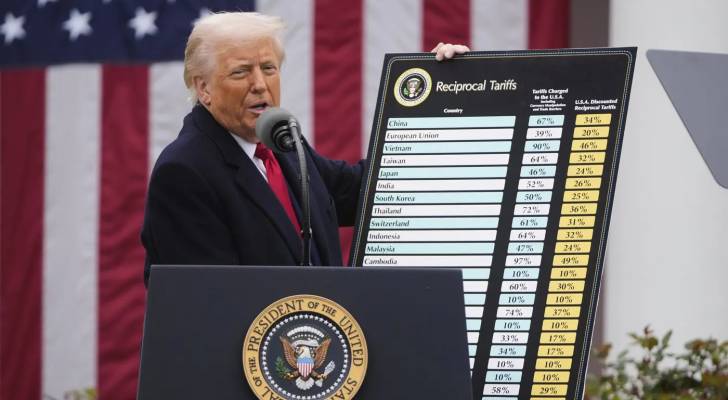Donald Trump presenting the "Liberation Day" tariffs
US court blocks Trump’s global tariffs
A US trade court has ruled against President Donald Trump’s attempt to impose blanket global tariffs, stating he overstepped his authority in doing so.
The decision, delivered by a three-judge panel at the Court of International Trade, marks a major setback for the Trump administration’s aggressive trade strategy, which included unilateral taxes on foreign imports.
The case centered on tariffs introduced in April on what Trump dubbed “Liberation Day.” The measures imposed a 10 percent baseline tariff on imports from several countries and prompted a sharp reaction from financial markets. Trump defended the decision by citing a “national emergency,” arguing that he did not require congressional approval.
But the court disagreed, siding with five small American businesses that brought the lawsuit. The companies—ranging from wine distributors to musical instrument retailers—claimed the tariffs inflicted serious financial harm, threatening their survival.
The Trump administration swiftly responded by filing an appeal, setting up the possibility of the case reaching the US Supreme Court.
The decision drew praise from critics of the former president’s trade policies. Oregon Attorney General Dan Rayfield described the tariffs as “unlawful, reckless and economically devastating.” Senator Ron Wyden, the top Democrat on the Senate Finance Committee, said the measures “jacked up prices on groceries and cars, threatened shortages of essential goods, and wrecked supply chains for American businesses large and small.”
Meanwhile, the White House issued a defiant statement, saying, “It is not for unelected judges to decide how to properly address a national emergency.” Stephen Miller, Trump’s deputy chief of staff, went further, calling the ruling a “judicial coup” in a social media post.
Kush Desai, a spokesperson for the administration, defended the tariffs by saying trade deficits had “decimated American communities and left our workers behind.”
The ruling comes amid broader shifts in US trade policy. Earlier this month, Washington and London finalized a bilateral agreement to lower tariffs on British cars and eliminate duties on UK steel and aluminum. It remains unclear how the court’s decision will affect that deal.
Market reaction was swift. The US dollar climbed and futures markets rallied after the ruling. Ray Attrill, head of FX strategy at National Australia Bank, noted, “The market is doing a kneejerk reaction… reversing a lot of the moves we’ve seen.”
The three judges behind the decision were appointed by different administrations—Trump, Obama, and Reagan—highlighting the nonpartisan nature of the ruling.




